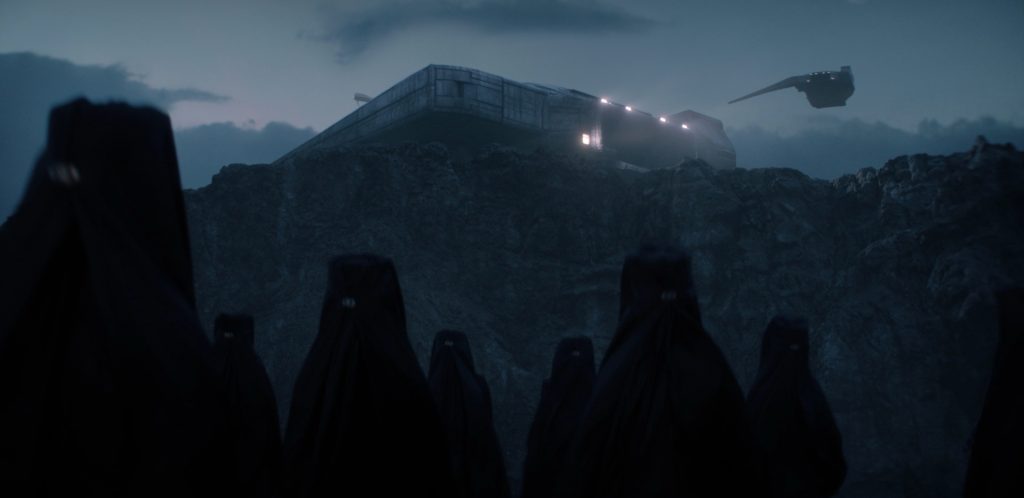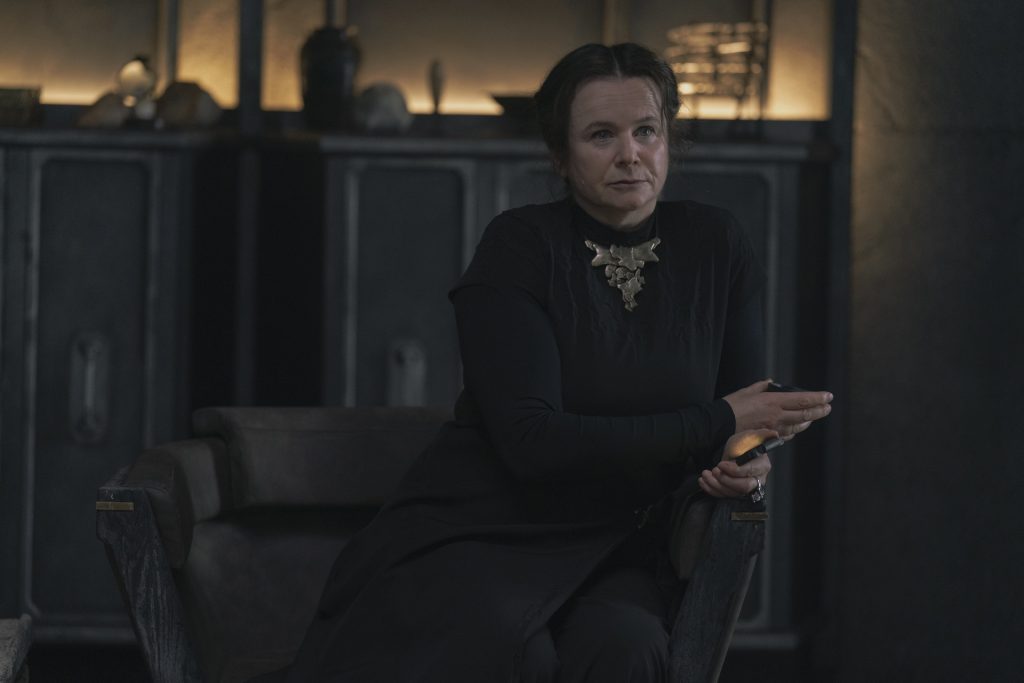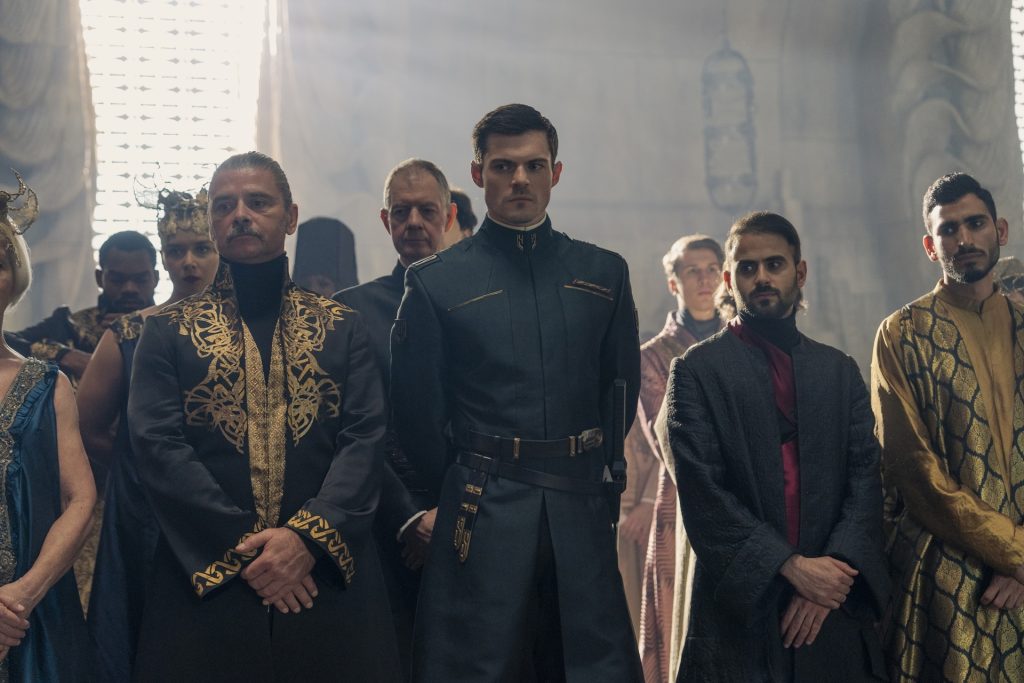For those of you who didn’t get your spice fix with the release of Dune: Part Two back in March, HBO has a treat for you with the fall release of Dune: Prophecy, a new prequel miniseries set 10,000 years before the events of Dune.
At a press conference, showrunner Alison Schapker and much of the show’s cast — including but not limited to Emily Watson, Travis Fimmel, and Chris Mason — discussed what it was like to join the Dune universe.
If you haven’t seen episode 1 of Dune: Prophecy yet, you should stop reading here because this article contains mild spoilers for the series premiere.

Dune: Prophecy Press Conference
Dune: Prophecy is based on the 2012 novel Sisterhood of Dune, written by Frank Herbert’s son, Brian, and Kevin J. Anderson. It is a prequel exploring the origins of the Bene Gesserit, the sisterhood of mystics often seen pulling the political strings in the Dune franchise. Series showrunner Alison Schapker explains how she had to balance faithfulness to the books while also creating something new.
“We’re really toggling between two time periods: one that tethers us to the books very closely and one that allows us to create,” she explains. “And we did that in conjunction with the Herbert Estate and very carefully and respectfully of the world-building in the novels. But it was exciting to have some room to adapt for television.”
Of course, since the release of Denis Villeneuve’s blockbuster films, the Dune franchise has become one of the most valuable IPs in Hollywood. It was only a matter of time before the franchise was expanded into television with a project like Dune: Prophecy. However, the new creators of any Dune project have a massive legacy they must live up to.
“I think that the Dune universe is just so vividly realized,” Schapker asserts. “I think it’s so visceral and specific and deep and provocative. It just has all the hallmarks of great storytelling because it leads you through an imagination of the future that, I think, is very unique. I think it’s a classic. I think it’s one of the most influential science fiction works ever written. And to be part of any corner of the Dune universe is a tremendous privilege.”

One of the defining characteristics of the Dune franchise is its complex characters. The lines between hero and villain or good and evil are incredibly blurred, and the characters in Dune: Prophecy are no exception. For the show’s cast, this involved stepping out of their comfort zone.
“We’re so lucky that we’ve got a backdrop like the Dune franchise and the look of it, but I just worry about what I want from whoever I’m acting with or how I want them to feel,” says Travis Fimmel, who plays Desmond Hart in Dune: Prophecy. “And this role is enjoyable because I don’t want them to feel good most of the time.”
“I generally play people that are empathetic, that have a moral compass, and it makes you examine bits of yourself and that whole kind of shark mentality,” explains Emily Watson, the show’s lead, who plays Bene Gesserit Mother Superior Valya Harkonnen. “And having been raised in a religious, quite a confined situation, that’s a survival instinct. And knowing what it means to be told you’re special, you’re chosen, all those kinds of things, I think it’s just part of me. There’s part of me in there somewhere.”
One actor whose role was uniquely challenging was Chris Mason, whose character Keiran Atreides is a distant ancestor of Timothee Chalamet’s Paul Atreides from the main film franchise. For obvious reasons, this character came with the most expectations from fans.
“I think it’s important to create something new, especially where we are,” Mason explains. “You can never be informed by the future, right? So there are a few things, I suppose, that track through the Atreides with the fighting style, especially in, you know, we see that as consistent. But now it is important to dive in with Alison and get into Sisterhood of Dune, which informs so much of the character going forward. And that’s where we started. It’s kind of like starting from scratch.”

Indeed, the challenge of Dune: Prophecy is trying to balance fans’ expectations of delivering something close to the films while also standing out as its own thing. Will fans be satisfied? Only time will tell, but Schapker and the cast and crew have done their best to pull off this balance.
“Just to be clear, Denis is doing his films. We’re doing our television show,” Schapker concludes. “So it was a pleasurable conversation I had with him where we just discussed our love of Dune and how, how Dune has existed, you know, for so long with many people taking a crack at telling stories in it and, and just how much we love the material and how letting something you care about that much, and that you know so many other people care about that much, be an animating drive to creating a story.”
She continues, “Obviously, he set a high bar, and we are absolutely blown away — the whole world is — with what he’s done with the films. But we also, you know, set out to take the audience to new places, new planets, new things, new corners of the Dune universe. And I think it’s always a beast to tackle something that big and meaningful to people. And so it was, it was lovely to hear, you know, his about his love of Dune as well.”
New episodes of Dune: Prophecy air on HBO and Max every Sunday at 9pm ET/PT.
